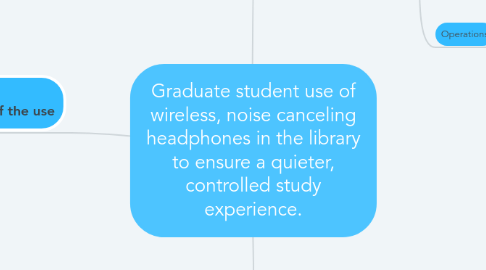
1. Social, institutional, organizational aspects of the use
1.1. Social or institutional structures
1.1.1. College
1.1.1.1. Baruch College
1.1.1.1.1. More undergrad students than grad students
1.1.1.1.2. Urban campus
1.1.1.1.3. Most students are commuters
1.1.1.1.4. Most students work part-time or full-time jobs
1.1.2. Academic library
1.1.2.1. 4 floors with mix of large study tables and small carrels
1.2. Power dynamics
1.2.1. Groups of students vs individual students in the library
1.2.2. Library staff and Baruch public safety vs. students
1.2.2.1. Students can complain
1.2.2.2. Staff and public safety can enforce or enable quiet
1.2.3. Age
1.2.3.1. Younger undergrads vs older graduate students
1.2.4. Gender
1.2.5. Reward structures
1.2.5.1. More efficient use of study time in the library means more free time for other activities
1.2.5.2. More productive study time in library leads to better grades
1.3. Norms
1.3.1. Acceptable noise policy of the library
1.3.2. Most students understand that you shoudn't disturb others
1.3.3. Some areas are prone to more noise (study tables) than others (carrels)
1.3.4. The library should provide options to help make the library a quiet place.
1.3.5. Library policies about headphone loans
1.3.6. Headphones shouldn't be so loud that others can hear the sound.
1.4. Values
1.4.1. Education is important
1.4.1.1. A graduate degree ensures a better job
1.4.2. Efficiency during dedicated study time
2. Aspects of the ICT
2.1. Components of the technological system
2.1.1. Hardware
2.1.1.1. Headphones
2.1.1.1.1. Hardware
2.1.1.1.2. Software
2.1.1.2. Equipment it connects to
2.1.1.2.1. Phone
2.1.1.2.2. Laptop
2.2. Operations
2.2.1. Playback
2.2.1.1. Transforms bluetooth signal into sound waves
2.2.2. Receives
2.2.2.1. Receives bluetooth signal
2.2.3. Charging
2.2.3.1. Batteries need to be recharged
2.2.4. Adjusting
2.2.4.1. Volume
2.2.4.2. Audio selections from laptop or phone
3. People using the ICT
3.1. Identity
3.1.1. Graduate students
3.1.1.1. MBA students
3.1.1.2. MPA students
3.2. Employment status
3.2.1. Part-time
3.2.2. Full-time
3.3. Level of educational attainment
3.3.1. Received BA or BS already
3.4. Gender
3.4.1. Mostly female
3.5. Nationality
3.5.1. 75% born outside of US
3.5.2. 20% are international students
